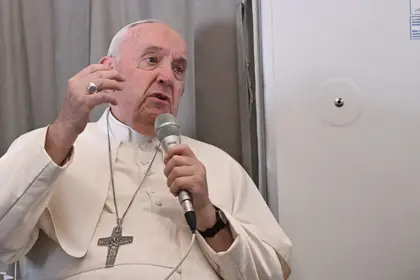Pope Francis has waded into the debate over Russia’s full-scale invasion of Ukraine, saying the war involves "imperial interests", with the world's "great powers" fighting there.
Speaking to Swiss television RSI, the pontiff described how he had offered to go to Moscow to negotiate peace, but had been rebuffed. "(President Vladimir) Putin knows that I am available," he said, according to a transcript published by RSI, ahead of the interview's broadcast on Sunday.
JOIN US ON TELEGRAM
Follow our coverage of the war on the @Kyivpost_official.
"But there are imperial interests there, not just of the Russian empire, but of the empires of other sides. It's typical of empires to put nations in second place."
The Argentine pontiff has repeatedly called for peace in Ukraine, although he was criticised in the first months after Russia's invasion for not explicitly blaming Moscow.
In the interview, Francis repeated his assessment that the conflicts around the globe currently amounted to a third "world war", AFP reports. "The great powers are all involved. The battlefield is Ukraine. Everyone is fighting there," he said.
Pope Francis’s comments about Ukraine have regularly caused controversy. In an interview with America, a Jesuit magazine, published Nov. 28, he said: “When I speak about Ukraine, I speak about the cruelty because I have much information about the cruelty of the troops that come in.
“Generally, the cruelest are perhaps those who are of Russia but are not of the Russian tradition, such as the Chechens, the Buryats and so on. Certainly, the one who invades is the Russian state. This is very clear.”

EU Transfers €1.5 Bln Raised From Russian Assets for Ukraine
The Russian tradition the Pope speaks of is Christian, specifically Russian Orthodox, whereas Chechnya is a predominantly Muslim country and the Republic of Buryatia, in Siberia, has a sizeable Buddhist population.
Russian forces have been accused of committing a multitude of war crimes during their invasion of Ukraine, the scope of which suggests that such actions are not limited to ethnic or religious groups within the country’s armed forces.
Attempt at Reconciliation Misguided
On Good Friday, last year, the Vatican decided it would be a good idea to have both a Ukrainian and a Russian woman holding the cross during the “Way of the Cross” procession through Rome’s Colosseum.
The Ukrainian Greek Catholic Archbishop, Sviatoslav Shevchuk, said the gesture was “inappropriate and ambiguous, and does not take into account the context of Russian military aggression against Ukraine.”
Did NATO facilitate the Invasion
In May 2022, Pope Francis said that NATO “barking” at Russia’s door “perhaps facilitated” the decision to invade.
The line echoed Kremlin propaganda that it was “provoked” into invading Ukraine by NATO’s actions but since then, Putin himself acknowledged a month later it was an imperial war to “return” land he sees as Russian.
Perhaps the Invasion was Provoked
Despite Putin’s admission, just a few days later Pope Francis said the invasion was “perhaps somehow either provoked or not prevented.”
He added: “Someone may say to me at this point: but you are pro-Putin! No, I am not. “It would be simplistic and wrong to say such a thing. I am simply against reducing complexity to the distinction between good guys and bad guys, without reasoning about roots and interests, which are very complex.”
‘That poor girl’
In August, a car bomb killed Darya Dugina, the daughter of a prominent Russian ultra-nationalist who had repeatedly called for the destruction of Ukraine.
Referring to her death, the Pope described her as an innocent victim of war and as “that poor girl thrown in the air by a bomb under the seat of a car in Moscow.”
Ukraine’s ambassador to the Vatican said the Pope’s words were “disappointing.”
You can also highlight the text and press Ctrl + Enter






